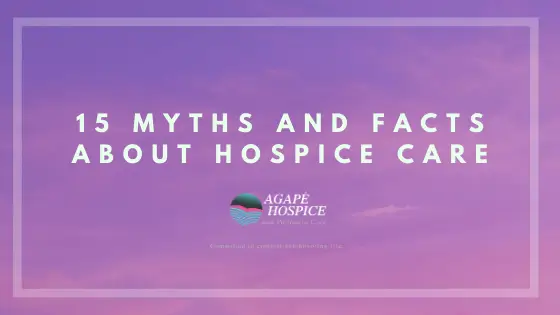Hospice Myths
Debunking Hospice Myths
Hospice care is an invaluable service that provides comfort and support to individuals nearing the end of life. However, many myths about hospice engender confusion and fear, preventing people from taking full advantage of the care available to them. Learn the facts about 15 common hospice myths to help you better understand what this type of care truly offers.
Myth 1: Hospice Means You’ve Given Up Hope
Fact: Hospice care does not equate to giving up, nor does it mean death is imminent. Instead, hospice focuses on enhancing the quality of life when a cure is no longer possible. The idea of “hope” shifts from curing the illness to seeking comfort, peace, and time with loved ones. Hospice care helps patients live their remaining days to the fullest.
Myth 2: Hospice Is Only for Cancer Patients
Fact: This hospice care myth stems from its early association with cancer care, but hospice is now a widely used resource for various terminal illnesses, including heart disease, dementia, lung disease, and more.
Myth 3: Hospice Is a Place
Fact: Hospice is not a specific place but a type of care that can be provided wherever the patient feels most comfortable. Most hospice care occurs in the patient’s home, but it can also be delivered in nursing homes, assisted living facilities, and dedicated hospice centers. Agape Hospice & Palliative Care serves patients in their homes.
Myth 4: Hospice Care Is Only for the Final Days of Life
Fact: Many people mistakenly believe hospice is only appropriate in the last few days or hours of life. In reality, hospice care typically begins when a doctor estimates a life expectancy of six months or less. Starting hospice care early allows patients to receive extended support, manage symptoms effectively, and spend meaningful time with loved ones.
Myth 5: You Must Sign a DNR (Do Not Resuscitate) Order to Receive Hospice Care

Fact: While a DNR order is a legal document often associated with end-of-life care, it is not a requirement for entering hospice. Patients and families retain control over medical decisions, and hospice care focuses on providing comfort and support according to the patient’s wishes.
Myth 6: Once You Choose Hospice, There’s No Turning Back
Fact: Hospice care is not an irreversible decision. Patients have the right to leave hospice at any time if their condition improves or they decide to pursue curative treatments again. If needed, they can reapply for hospice care later without penalty.
Myth 7: You Can’t Keep Your Doctor in Hospice Care
Fact: On the contrary, patients are encouraged to keep their doctors when they enter hospice care. The hospice team collaborates with the patient’s primary physician to develop a care plan that meets the patient’s needs.
Myth 8: Hospice Care Is Expensive
Fact: Hospice care is covered by Medicare, Medicaid, and most private insurance plans, making it accessible to those who need it. Coverage extends beyond medical care to include medications, supplies, and equipment related to the patient’s terminal illness. Financial concerns should never prevent someone from accessing hospice care.
Myth 9: Hospice Provides 24/7 Care
Fact: While hospice care is available 24/7, this doesn’t mean a caregiver is always present in the home. Hospice services are based on scheduled visits by a qualified medical team. However, support is always just a phone call away, and emergency visits can be arranged if necessary.
Myth 10: Hospice Patients Die Sooner
Fact: Hospice care neither hastens nor prolongs life. Studies show that some patients may live longer and with better quality of life when they receive hospice care compared to those who do not. The goal is to manage pain and other symptoms so patients can live their remaining time as comfortably as possible.
Myth 11: Hospice Is Only for Elderly People
Fact: Hospice care is available to people of all ages, including children, who are facing a life-threatening illness. The focus is always on providing compassionate care tailored to the patient’s needs, regardless of age.
Myth 12: Families Have No Control Once Hospice Begins
Fact: Hospice care is centered on the patient and their family. Loved ones are encouraged to be involved in decision-making and care planning. Hospice also provides emotional support to families, including bereavement and grief support services for up to a year after the patient’s death. This ongoing support is a crucial hospice service, helping families cope with their loss and find comfort during a difficult time.
Myth 13: You Need a Doctor’s Referral to Start Hospice Care
Fact: While a doctor’s certification is required to officially begin hospice services, anyone can initiate a referral. This means a patient, family member, or friend can contact a hospice provider directly to explore options and receive guidance.
Myth 14: Hospice Care Means the Patient Will Be Sedated
Fact: A common hospice myth is that care involves heavy sedation, leaving the patient unconscious or unresponsive. In reality, hospice care may consist of managing pain with medication, but the goal is not to sedate the patient unnecessarily. Pain and symptom management are carefully tailored to each individual’s needs so they can remain alert as much as possible.
Myth 15: Hospice Is Only for Bedridden People
Fact: While some hospice patients are confined to their beds, care is not limited to these individuals. Hospice care supports patients in various stages of mobility, using medications and pain management techniques to enable them to continue participating in daily activities for as long as they can.
Compassionate, Personalized Hospice Care
Now that you’ve dispelled these common myths about hospice, you may be ready to find care for yourself or a loved one. Agape Hospice & Palliative Care provides personalized and compassionate care during the final stages of life. As a locally owned and nationally accredited provider serving Los Angeles and Orange Counties, we pride ourselves on offering more personal and attentive care than larger corporations. Our team is highly responsive to referrals and calls, ensuring you receive the best care when you need it most. To learn more about our in-home hospice services and other end-of-life care, please contact us today.


